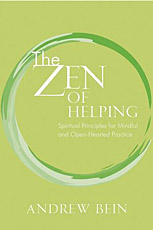Andrew W. Bein has 23 years of experience as a clinician, consultant trainer, and researcher. He has worked in child welfare, public schools/special education, youth programs, multiservice centers, substance abuse, and private practice. He is a full professor with the Division of Social Work at California State University. Bein has been a Zen student for 10 years. Using case studies, exercises, anecdotes, and poetry, the author spells out the spiritual principles of a mindful and open-hearted practice for those in the helping professions.
One of the first things Bein acknowledges is that uncertainty and not-knowing are crucial elements in all work with clients. Taking a cue from his Zen teacher Joan Halifax, he talks about the importance of "strong back/soft front." Strong back refers to the equanimity that enables us to deal with turmoil, confusion, suffering, and despair. Soft heart goes along with strong back as we are patient and still, reaching out to others in openness to the present moment. Bien quotes a poem by Danna Faulds:
"Allow it all to be,
no need to grasp or push away.
Present with each moment,
the whole of you, body, mind
and soul, opens to receive."
In a series of well-reasoned and imaginatively presented chapters, the author spells out other spiritual principles in the Zen of helping: radical self-acceptance of clients, context, and self; mindfulness; curiosity, compassionate caring, and inspiration; bearing witness to trauma and pain; embracing contradiction and paradox; making space for client spirituality; and dealing with failure. The last principle is a critical one given the fact that we are all flawed creatures. Bein recommends that those in the helping professions learn to feel at peace with failure and not beat themselves up mercilessly. Our failings can become teachable moments — as long as we do not see our life as a failure. Each setback is a chance to start afresh.
